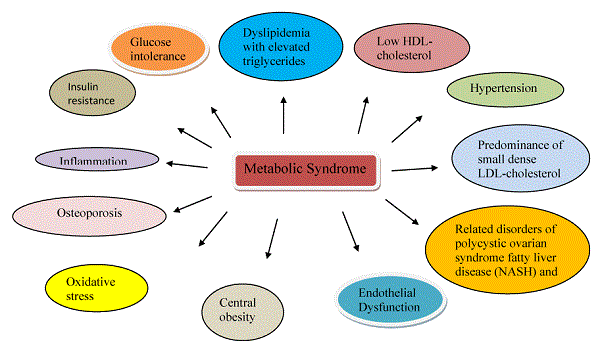
Metabolic syndrome describes a group of conditions that increases your risk for developing heart disease, diabetes, stroke and other health problems. Studies estimate that more than 30% of the US population has metabolic syndrome, and about 85% of people who have diabetes also have it. It is also becoming more common in Europe, Latin America and Asia. In the US, it has been found that Mexican Americans and people who are over 60 years old are most likely to be affected.
What Is Metabolic Syndrome?
A person who has metabolic syndrome has a combination of risk factors that make him prone to develop certain diseases. These factors include high blood pressure, insulin resistance, high cholesterol and a tendency for blood clotting abnormalities. These individuals are often obese or overweight. Metabolic syndrome is sometimes called Syndrome X, dysmetabolic syndrome, orinsulin resistance syndrome.
The association between cardiovascular disease and various metabolic disorders has long been studied. If you have metabolic syndrome, you have a high risk of developing cardiovascular disease and type 2 diabetes.
Symptoms of Metabolic Syndrome
Metabolic syndrome manifests clinically as:
- High blood pressure (hypertension)
- High blood sugar levels (hyperglycemia)
- High cholesterol/triglycerides (hypertriglyceridemia)
- Low good cholesterol or HDL (high-density lipoprotein cholesterol)
- Increased belly fat (abdominal obesity)
- Chest pains
- Shortness of breath
In patients with diabetes, signs may include hirsutism, retinopathy, acanthosis nigricans and peripheral neuropathy
In patients with severe dyslipidemia, signs may include xanthomas/ xanthelasmas (yellowish cholesterol plaques in the skin)
There is also a chance that complications may arise from metabolic syndrome, such as:
- Diabetes. Metabolic disorders, when uncontrolled, can lead to insulin resistance, which makes your glucose levels continue to rise. This will eventually lead to diabetes and its complications.
- Cardiovascular disease. Persistently high cholesterol levels and high blood pressure may lead to buildup of cholesterol deposits or plaques in your blood vessels (arteries). These can cause narrowing and hardening of your arteries, which can increase your risk for stroke or heart attack.
Causes and Risk Factors of Metabolic Syndrome
1. Causes of Metabolic Syndrome
Being diagnosed with metabolic syndrome is a wake-up call. Find out what causes this condition and try to improve on your health.
- Insulin resistance. The body normally uses sugar (glucose) from food with the help of a hormone called insulin to produce energy. People who develop insulin resistance are not able to use sugar, thus it accumulates in the blood. Increasing levels of sugar in the blood leads to metabolic syndrome and diabetes.
- Obesity. Studies show that consuming a diet that is high in fats and sugar while not getting enough exercise is associated with metabolic disorders. So, people who have excess abdominal fat increase their risk of developing metabolic syndrome.
- Hormonal imbalance. Certain conditions, such as polycystic ovary syndrome can lead to hormonal imbalance and increase your risk for metabolic syndrome.
2. Risk Factors of Metabolic Syndrome
Experts have identified five major risk factors that can lead to metabolic syndrome. Having at least three of these risk factors will make you get a diagnosis of metabolic syndrome.
- Abdominal obesity. Having a large waistline or an apple-shaped body means you have excess belly fat, which is linked to heart disease and diabetes.
- High triglyceride. Triglycerides are harmful fats that accumulate in the blood and increase your risk for chronic disease.
- Low HDL. HDL is good cholesterol, which helps remove bad cholesterol from the blood. Having too little of HDL increases your risk for heart disease.
- High blood pressure. As the force of blood flow pushing against the walls of the arteries increases, your heart pumps harder to push blood. Over a long time, this can cause damage to your heart.
- High fasting blood glucose. This may be an early sign of diabetes, which is also linked to cardiovascular disease.
- Other risk factors that have been linked to metabolic syndrome include menopause, smoking, consuming a diet high in carbohydrates, and physical inactivity regardless of weight.
Diagnosis of Metabolic Syndrome
Experts from various organizations such as International Diabetes Federation, American Heart Association, National Heart, Lung, and Blood Institute, and World Heart Federation use the following criteria to diagnose metabolic syndrome:
- Abdominal obesity. In men, this is defined as having a waist circumference of at least 40 inches, while in women it is at least 35 inches.
- Triglyceride levels. Youare considered to have high triglyceride if it measures at least 150 mg/dl.
- HDL cholesterol levels. Low HDL in men occurs if it is below 40 mg/dL and in women below 50 mg/dL.
- Blood Pressure. High blood pressure is defined as 130/85 mmHg or greater.
- Fasting blood glucose. High blood sugar is defined as 100 mg/dL or greater.
Prevention
It is better to prevent metabolic syndrome than to treat it. Here are some preventive measures:
- Eat smart. Choose nutrient-dense but low calorie foods such as fruits, vegetables, whole grains, lean meat, fish, and fat-free or low-fat dairy products. Avoid processed foods which contain a lot of unhealthy fat, salt and added sugars.
- Lose excess weight. Learn to balance your calorie intake and energy expenditure.
- Have regular exercise. Experts recommend doing at least 150 minutes of moderate to vigorous physical activity per week.
- Quit smoking. Studies show that smoking is linked to metabolic syndrome and various chronic diseases, so you’d better quit smoking to avoid getting metabolic syndrome.
- Take prescribed medications. Your doctor may prescribe medications to improve your blood pressure, cholesterol and blood sugar levels if lifestyle modifications alone are not enough to lower your risk of developing metabolic syndrome.